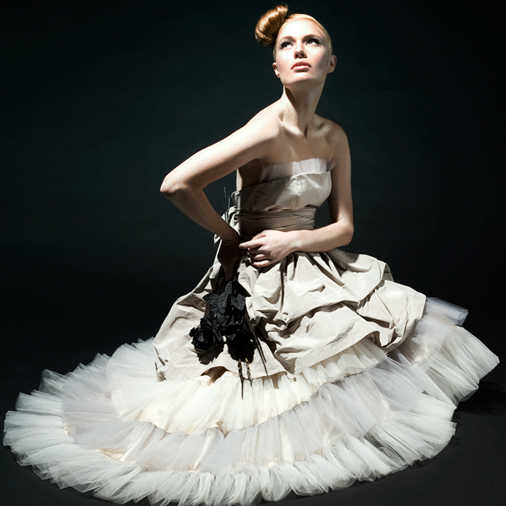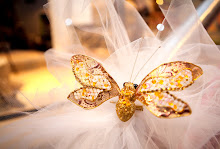 As with anything remotely wedding related, the entire industry of wedding flowers is a sector that expects you to spare no expense when it comes to decor for your special day. According to Elegala, a wedding website, "you should expect" to spend 8-10% of your total wedding budget on flowers for your wedding party and additional ceremony and reception decor. So, if your wedding budget is $10,000, you are talking about spending $800 to $1000. If your budget is more like $5000 (which is low, but not impossible, though others may tell you differently), you would be expected to spend $400 to $500. Frankly, this is absurd.
As with anything remotely wedding related, the entire industry of wedding flowers is a sector that expects you to spare no expense when it comes to decor for your special day. According to Elegala, a wedding website, "you should expect" to spend 8-10% of your total wedding budget on flowers for your wedding party and additional ceremony and reception decor. So, if your wedding budget is $10,000, you are talking about spending $800 to $1000. If your budget is more like $5000 (which is low, but not impossible, though others may tell you differently), you would be expected to spend $400 to $500. Frankly, this is absurd.Let me say upfront that I fully understand that the reason you pay top dollar for a florist is that you are hiring an aesthetic expert, and if you have the desire and money to fund this type of artist, then by all means do so. Just as we commission landscape architects to make our lawns beautiful, so too do we hire specialists for occasions such as these. Of course, lawns last year round, and a wedding is a single, transitory day, and as it's likely that no one (aside from florists, perhaps) attending your special event will discern the difference between professional flower arrangements and something put together by yourself or a friend with a tasteful eye, why not go the route of DIY? You wouldn't pay for a landscaper if it weren't in your household budget, you'd garden yourself. Likewise, why would you pay a floral expert if it weren't reasonably within your budget?
Enough waxing ethical. How do you save money on flowers and still foster a delightful decor for your wedding?
Typical Flower Arrangements
Here is a list of the types of flowers you might expect at a wedding (note: one way to reduce cost is to eliminate some of these from your purchasing list --decide what's important!).
1. Wedding party flowers
- Bridal Bouquet
- Bridesmaids bouquets (including maid of honor if you have one)
- Corsages for mothers of the marrying individuals
- Groom's boutonniere
- Boutonnieres for fathers and groomsmen (including best man if you have one
- Archway/Trellis
- Altar flower arrangement
- Various other arrangements depending on your space
- Centerpieces for tables
- Arrangements for catering tables
- Various other arrangements depending on your event space
Ways to save on flowers.
Choices in green text are eco-friendly.
1. Wholesale flowers. Whether you live in a city or in a more rural area, it is likely that there is a "farmer's market near you." Many times at farmer's markets you can find flowers for sale in addition to fruits and veggies. This is obviously more true during the spring through early fall, and flowers will obviously be available according to geographic range and seasonal availability. If you are curious about the seasonality of flowers (for instance, tulips are an April-May flower, but stop being "in season" starting in June), visit this Wedding Flowers Guide. You will save a great deal of money if you purchase flowers from a local wholesale market (or something close
 to it, like a flower cart in the city), and recruit a friend or family member with a knack for crafts to assemble your bouquets, boutonnieres, and corsages. Additionally, you will earn "earth karma points" for reducing your carbon imprint on the globe. Supporting local blooms and local growers is an eco-friendly choice to make, as the flowers you choose will not have been imported from a far away land (= mucho CO2 from fossil fuel emissions).
to it, like a flower cart in the city), and recruit a friend or family member with a knack for crafts to assemble your bouquets, boutonnieres, and corsages. Additionally, you will earn "earth karma points" for reducing your carbon imprint on the globe. Supporting local blooms and local growers is an eco-friendly choice to make, as the flowers you choose will not have been imported from a far away land (= mucho CO2 from fossil fuel emissions).Floral tape works wonders, and believe it or not, figuring out how to use it is not that hard. I made the bridal and matron of honor bouquets for my aunt's wedding and in doing so discovered the ease of this task. You basically arrange flowers the way you want them to look, wrap them in tape, and then wrap the stem in ribbon. Fin. For the slightly more difficult task of making boutonnieres, visit this eHow article for instructions.
Can't find a local farmer's market? Go to your local grocery store. Though you can't guarantee that all the blooms are locally grown and in-season, making them an eco-friendly choice, they will be cheap!
2. Economy size flowers? When I found out that Costco has an extensive wedding section on its website, my first thoughts were: "Wedding packages for the whole family? Economy size weddings?" It turns out that Costco flowers are not larger than your average blossom, but like all things this company markets, Costco offers extensive floral packages for incredible prices, and they are customizable for your needs. You can order packages that include all bridal party flowers as well as centerpieces for your wedding. Costco is particularly a deal for the wedding party flowers. Doing some combination of Costco (if there's one near you) and wholesale flowers for other arrangements is, in my experience, the most inexpensive and rewarding way to go. Another online wholesaler I was able to find is freshroses.com (which has a mission statement about environmental stewardship, which I always like!).
3. In Season. Whether you are going with a florist or buying your own posies for the big day, choose flowers that are IN SEASON. They will be cheaper.
4. The "Off" Season. If you have an autumn or winter wedding, your floral choices may be more limited, but you will get a much better deal not only on flowers, but on all wedding related expenses. The wedding season is generally, I'd say, April through September (if you're in California, maybe it's year round because the weather there is always, uh, freaking beautiful). If you have a fall or winter wedding, there are many ways you could incorporate seasonal decor (like mistletoe, holly, carnations, pumpkins, berries, harvest-y items, etc).
5. Fake flowers. Fake flowers, guaranteed, are cheaper than real ones, and, hey, bonus(!) - they are recyclable too! You can donate them, keep them for household decor, or pass them on to another bride to be. When planning my own wedding, I found this craft site extremely helpful. They have tons of wedding paraphernalia, including all the trappings for fake flower bouquets, boutonnieres, and corsages (as well as the supplies necessary for building these items from real flowers), centerpieces, and pretty much any other wedding decor related item you can think of.
6. Don't use flowers. By this, I mean for centerpieces, but hey, if you want to go flowerless in general, I say go for it. I just went to an outdoor wedding south of Providence in RI that took place on a lovely campground bordering a beach. There were a couple of flower arrangements and other than that, there was just exquisite, natural scenery. The centerpieces were caraffes full of delicious juice - juice, being consumable, rates way higher than flowers in my book.
Centerpieces can be candles or bowls full of candy (purchased in bulk) or fishbowls that people can take home at the end of the night or a small potted plant. They can be WHATEVER YOU WANT THEM TO BE and they certainly do not have to cost over 1000 dollars, which the Bridal Association of America tells me is the "expected" expenditure. I feel pretty saucy when it comes to this topic, so there may be a follow-up post with creative centerpiece ideas.
7. Size matters. Another way of cutting cost, especially if you are hiring a florist, is to reduce the size of the wedding party. The fewer attendants you have, the fewer bouquets, corsages, and/or boutonnieres you will have to acquire.
I hope this entry has been helpful. The overarching point of this posting (and really, this blog), is that there isn't one way to have a wedding. Creativity will save you money and it will inspire your guests! Your guests are not there to judge your taste in flower arrangements - they are there to celebrate you and your marriage! The ambiguous "they" say not to sweat the small stuff, and though it may not seem like it just now, this is small stuff.
One last note. If you do hire a florist for any of the components of your day, don't let them push you around. As with any business, you are how they make money. Go in with clear ideas of what you want and don't be afraid to ask about price. Hell, with the recession, it's verging on trendy to price hunt. If any readers have further suggestions, I'd love to hear them!


